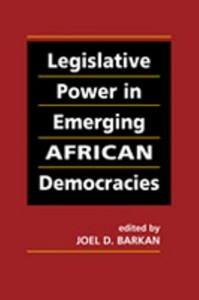|
Reviewed by Harvey Glickman, Ph.D., Professor Emeritus of Political Science at Haverford College Observers of African politics recognize that democratization in a number of African states is indeed occurring—characterized by several reasonably free and competitive elections, peaceful transfers of power, an environment of free speech, an expanding civil society. The question remains, however, as to how successful these burgeoning democracies will be and which elements will help this transition thrive. Legislative Power in Emerging African Democracies—an edited collection by Joel D. Barkan, emeritus at University of Iowa, now a senior associate at the Center for Strategic and International Studies in Washington, DC—seeks to explore the relationship of legislative development to the level of democratization on the African continent to assess its impact on democracy promotion. As expected from a veteran and respected scholar like Barkan, this is not a journalistic account in the vein of exotic exceptions to the general run of African atrocity stories. Instead, he has assembled a group of “Western” and African (and one Asian) scholars who tackled a central question, based on an agreed premise: “why the legislatures in some emerging democracies have enhanced their capacity and power while those in others have not.” (p.3) The volume’s goal, as Barkan notes in the onset, is to answer the crucial question of whether legislatures in Africa’s young democracies “make a difference,” and if so, how and why?” (p. 3) As they tackle six cases on the continent—Benin, Ghana, Kenya, Nigeria, South Africa, and Uganda—the authors assume readers agree that helping the process of democratization along is a good idea. Derivatively, they also assume that building major national representative institutions is an equally good idea and that national assemblies are worth strengthening. So this is, in a sense, an assessment of some years of international aid and internal political movements to assist African regimes to strengthen their legislatures as instruments of accountability—representing popular opinion and influencing (ideally, helping make) executive policy. Of the six cases, South Africa and Kenya are adjudged the most advanced in terms of their national assemblies making a major difference in national policy. (Ironically, both countries were major British settlement colonies. Would it be mischievous to infer a new look in another context at settler imperialism?) Kenya, for example, illustrates the central argument which sets forth a chain of premises. As reported by Barkan and Fred Matiangi, “First, that the development of the legislature is both facilitated by and a contributor to the process of democratization overall…Second, that legislative development is the product of the presence of a ‘coalition for change’ among members of the body itself. Third, that the development of the legislature will not occur until such a coalition identifies the steps to be taken to enhance the capacity of the legislature to perform its core functions…” All of this “requires reformers to address the structure of incentives MP’s face that maintains the status quo.” (p. 41) Reform requires legislative insiders, supported by outsiders, to generate resources to overthrow the status quo. How? Salaries of legislators have to grow, financial support of the representational, the oversight and the research work of legislators have to grow, and the same applies to the work of a legislative committee system, ideally grouped around legislative functions. This seemed to begin to happen in the mid-1990’s in Kenya and South Africa, but seems to have backslid since then. The other cases—Uganda, Ghana, and Nigeria—provide weaker examples and weaker trends. Indeed Uganda offers a counter-intuitive example of progress in legislative development in a no-party parliament, indicating that a committee system, issue-based coalitions and the expansion of parliamentary institutional resources can be deployed to some limited effectiveness, especially with help from outside donors. Nevertheless, the dynamics of African politics, even within emerging democratic institutions, remains dominated by neo-patrimonialism—executive distribution of rewards and punishments through chains of political vassals and patrons down to the grassroots. Even Ghana, despite experiencing a second alternation in power through five contested elections since 1992, continues to demonstrate the resilience of executive domination of the political process. (pp. 148, 159, 169) And even the South African parliament—where some legislative muscle is exhibited now and then—can today be drifting toward the position of a “rubber stamp.” (pp. 205, 226) Barkan concludes that legislatures “are beginning ‘to matter’ in some (reviewer’s emphasis) of Africa’s emerging democracies.” (p. 231) Recognizing a duty to the policy community as well his academic peers, Barkan offers lessons gleaned from the case studies documented in this volume. He explains that legislative institutions still face executive dominated African governments in the struggle to amass countervailing power and this makes for fragile developmental gains for legislatures. And that while legislative development in great part is an internally driven process, allies in civil society—the press and outside agencies—are important to push reform along. (pp. 247-248) He cautions that some institutional elements are tough to change, such as, the electoral system, the structure of civil society, and the executive. But some things can change, such as formal rules of parliament, salaries of M.P.’s and their staff, the committee system, and work facilities and reformers can achieve much by following a strategy of quick victories (e.g., raising salaries) thus enabling the formation of larger coalitions, especially in the face of executive domination of African politics. In method and exposition, this volume is a service to social science and policy-making. Through judicious use of case studies, Legislative Power in Emerging African Democracies provides readers insight into the current state of democracies in Africa and how their individual legislative bodies can help direct the continent’s future. |


 Legislative Power in Emerging African Democracies
Legislative Power in Emerging African Democracies